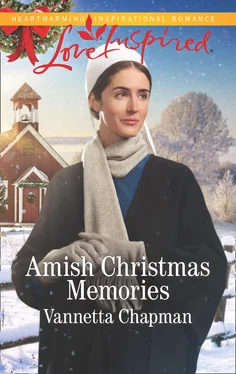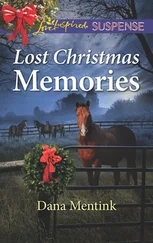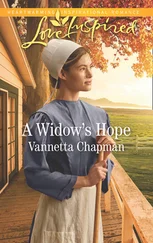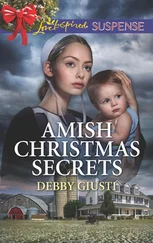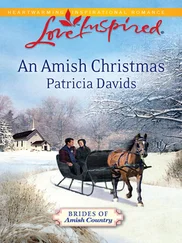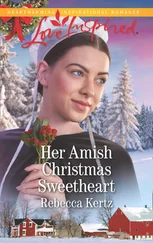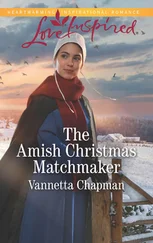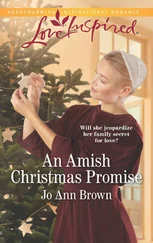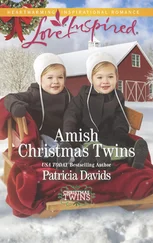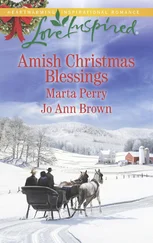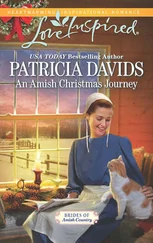“ Ya , I’m aware of that, but we have plenty put back.”
“What good are they, Caleb?” His mother held up a hand. “I’m not arguing with you. It’s only that I know nothing about them.”
“The yarn is quite popular,” Rachel said.
Everyone turned to stare at her. She blushed the color of a pretty rose and added, “I don’t know how I knew that.”
“Did you maybe have alpacas before? At your parents’ farm?”
“I don’t—I don’t think so, but I can remember the yarn. Spinners and knitters and even weavers use it.”
“Any chance you recall how much trouble they are to raise?” His father laughed at his own joke, and then he reached across the table and patted her hand. “I don’t expect you to answer that. I was only teasing because my son seems set on bringing strange animals onto our farm.”
“I thought you were a traditionalist,” Rachel said, then immediately pressed her fingers to her lips as if she wanted to pull back the words.
But if Caleb was worried he might have to answer that, might have to explain in front of his parents their conversation the night before, he was pleasantly mistaken.
Ida was up and clearing dishes, and she answered for him. “Oh, ya . In nearly every way that’s true. Caleb is quite traditional.”
“Unless it comes to animals,” his father said. “We’ve tried camels.”
“How was I to know they’d be so hard to milk?”
“And goats.”
“We learned a lot that time.”
“ Ya , we learned if water can go through a fence, then so can a goat.”
“We’re a little off topic here.” Caleb tried to ignore the fact that Rachel was now grinning at him as if she’d discovered the most amusing thing that she might insult him with later. “Let’s just go look at the alpacas together. We could go this morning, and I’ll fix the fence this afternoon.”
“How about we do it the other way around?”
“Deal.”
He was up and out of his chair, already glancing at the clock. If he worked quickly, they could be there before noon—surely before anyone else came along and bought the alpacas out from under their noses.
“Caleb, would you mind making sure that the front porch and steps are free of ice?”
“The front porch?”
“We’re going to have visitors, and I don’t want anyone slipping.”
Visitors? On a Tuesday morning? “I was headed out to work on the fence line.”
“And then look at alpacas. I heard.”
He tugged on his ear. His mother was acting so strangely. Since when did she have weekday visitors? When had she ever asked him to clean off the front-porch steps?
“Shouldn’t take but a few minutes,” his father said. “Your mother wouldn’t ask if she didn’t need it.”
The rebuke was mild, but still he felt his cheeks flushing.
“ Ya , of course. Anything else?”
“You could move your muddy boots off the front porch, as well as that sanding project you’ve never finished.”
“Did I miss something? Are we having Sunday service here on a Tuesday?” He meant it as a joke, but it came out as a whine.
Rachel jumped up to help his mother, not even attempting to hide her smile.
“Some ladies are stopping by.” His mother reached up and patted his shoulder. “I just don’t want them tripping over your things.”
He rolled his eyes but assured her that he’d take care of it right away.
When he stepped out onto the front porch, his dad clapped him on the back. “Give them a little space. Your mamm , she’s happy to have another girl around the place.”
“ Ya , that makes sense, but—”
“She’s convinced that Gotte brought Rachel into our lives for a reason.”
“To give me more work?”
“And, of course, we all want to make the transition easier for Rachel. This is bound to be a difficult time.”
From the grin on Rachel’s face, he didn’t think it was as difficult as his father imagined, but instead of arguing with him, he found the stiff outdoor broom and began sweeping the steps to make sure there was no ice or water or snow there. Woman’s work , he thought, but that wasn’t what was bothering him. Change was in the air, and Caleb had never been one to embrace change—unless it was regarding farm animals.
In every other way, stubborn and old-fashioned was more his style.
* * *
Ida had shared with Rachel that a few ladies would be stopping by. “They heard about your situation and want to help.”
She wasn’t sure what that meant, but she’d nodded politely, and then Caleb had brought up alpacas, and the conversation had twisted and turned from there.
Now it was nearly noon, and she plopped onto the couch and stared at the items stacked on the coffee table.
Ida sat across from her, holding a steaming mug of coffee. “Seems everyone from our community pitched in. It’s gut , ya ?”
“Of course. I’m a bit stunned. How did they even know that I’d need these things? How did they know I was here?”
“Word travels fast in an Amish community. Certainly you remember that.”
“We used to call it the Amish grapevine.”
Ida laughed. “I’ve heard that before, too, but ‘grapevine’ has a gossipy sound to it. This is really just neighbors helping neighbors.”
Rachel picked the top dress off the pile of clothes. The color was midnight blue—Caleb would be happy about that—and the fabric was a good cotton that would last. It was also soft to the touch. She ran her hand across it, humbled by all that these women, who were strangers to her, had given.
“We’ll need to take those in, of course. You’re shorter and smaller than Rebekah’s girls.”
“Won’t they need these?”
“Not likely, both have put on a good bit of weight since marrying, and that was before they were expecting her first grandchildren. No, I don’t think they’ll be needing them back.”
There were underclothes, kapps , two outdoor bonnets and a coat. All except the underclothes were used, but in good condition. Someone had brought a Bible and a journal for writing in. She thought those might come in handy. Dr. Gold had mentioned that writing a little every day might help her memories return. There was also a new scarf and gloves, knitted in a dark gray that had a touch of shimmer to it. “This is beautiful work.”
“Melinda can do wonders with a knitting needle. I’ve always been more of a crochet person myself.”
Rachel stood up, went to the room she was staying in and returned with the blue scarf she’d apparently been wearing when Caleb had found her. No coat, but a scarf—strange indeed. “I think—I think I might be a knitter.”
“That’s why you knew about the alpaca yarn.”
“Maybe. I think so. I know this is called a stockinette pattern—you alternate rows of knitting with rows of purling.” She closed her eyes, could almost see herself adjusting the tension in her yarn, squinting at a pattern, knitting needles flying. She could be imagining, or she could be remembering. There was no way to know.
“Are you remembering anything else?”
“Only that this—” She ran her fingers over the scarf, then draped it around her neck. “It seems very familiar.”
“That’s a beginning.”
“If only I could remember more, but when I try, the headaches return.”
Ida walked over to the bookcase and brought back the packet of information from the doctor at the hospital. Rachel had already rifled through it twice. There were instructions, what to expect, warning signs, as well as two cards—one for her next appointment with Dr. Gold and another card with the name and contact information for a Dr. Michie. She’d spoken with the doctor a few minutes before leaving the hospital. She was a counselor of some sort and had told Rachel to call her if she’d like to make an appointment.
Читать дальше
